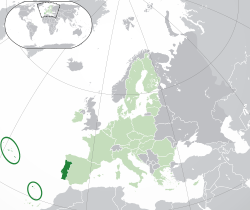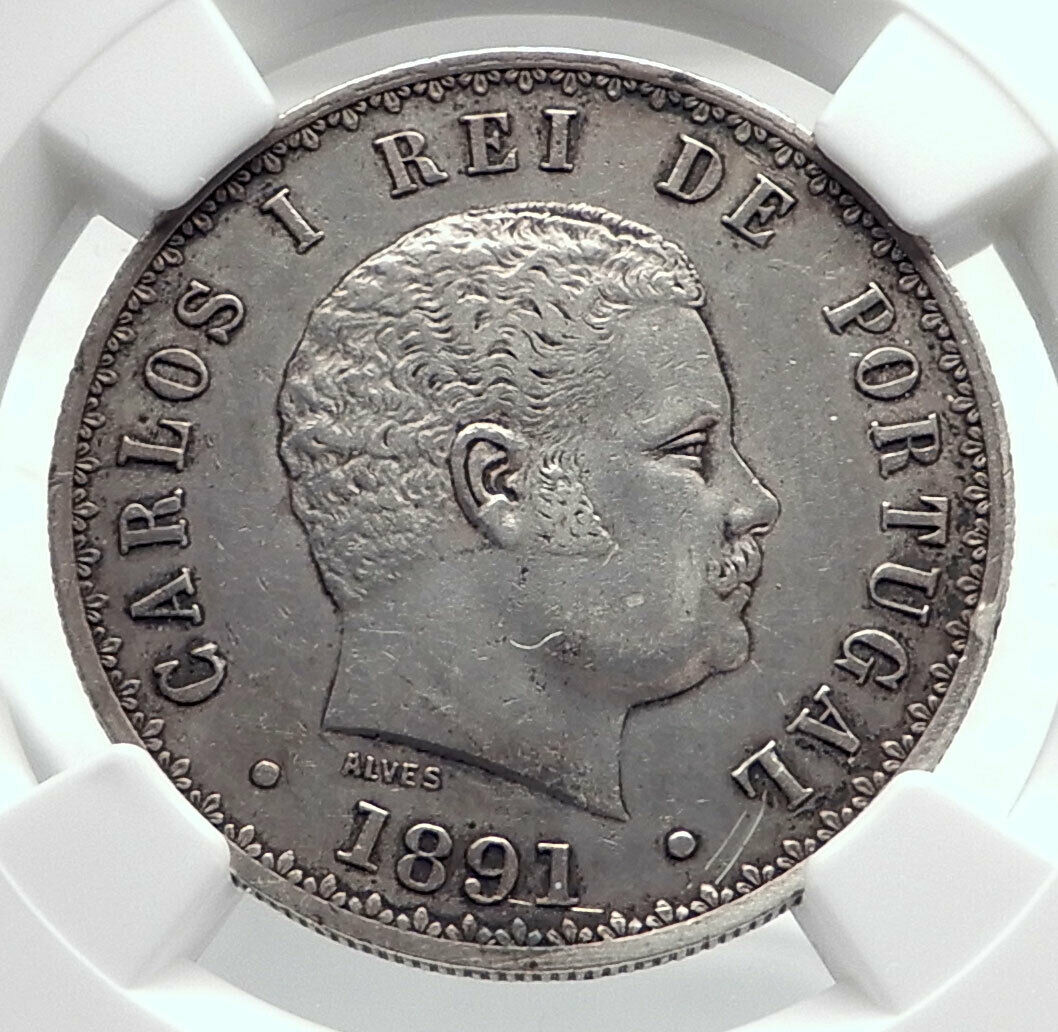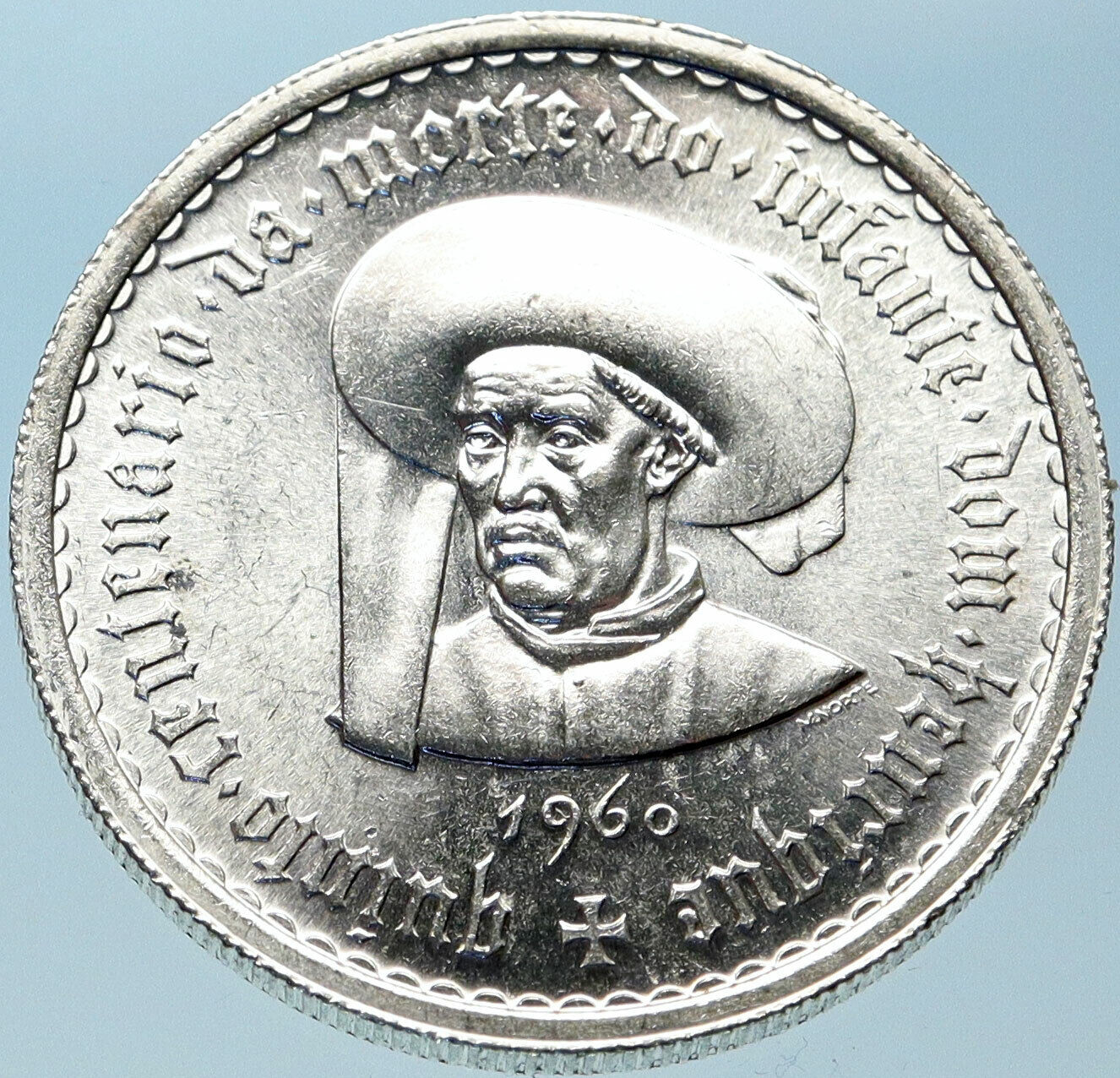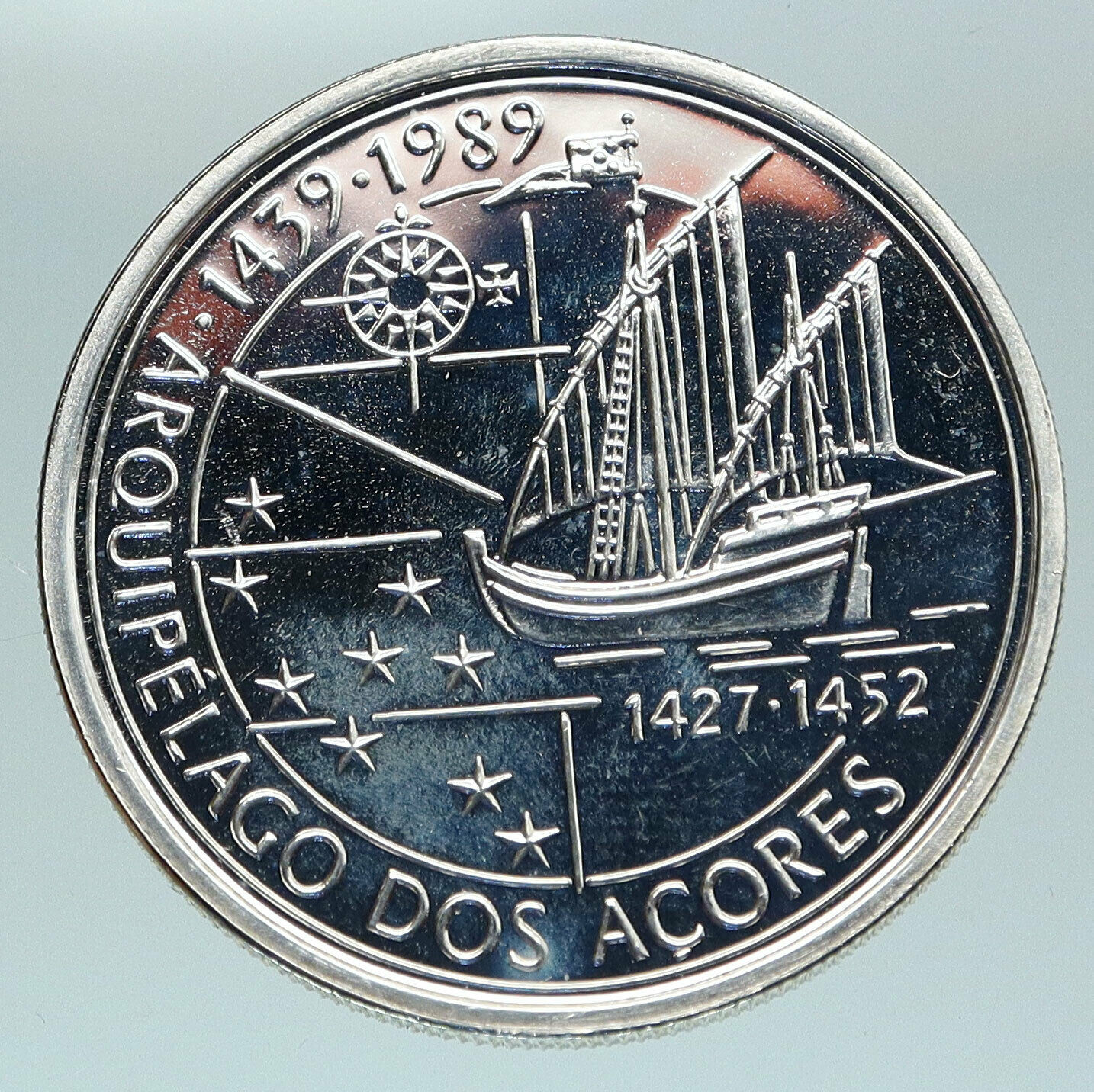|
Portugal under Luís I of Portugal – King: 11 November 1861 – 19 October 1889
1883 Bronze 20 Reis 30mm (12.04 grams)
Reference: KM# 527, Gomes# L1 07 | Engraver: Frederico Augusto de Campos
D·LUIZ·I·REI·DE·PORTUGAL, Portrait of Luís I of Portugal facing left.
XX REIS 1883, Large wreath (and olive branch to the right and an oak branch to the left both tied by a ribbon at the bottom) containing the value above the date.
You are bidding on the exact item pictured, provided with a Certificate of Authenticity and Lifetime Guarantee of Authenticity.
 Dom Luís I (31 October 1838 in Lisbon – 19 October 1889 in Cascais), known as The Popular (Portuguese: O Popular) was a member of the ruling House of Braganza, and King of Portugal from 1861 to 1889. The second son of Queen Maria II and her consort, King Ferdinand, he acceded to the throne upon the death of his elder brother King Pedro V. Dom Luís I (31 October 1838 in Lisbon – 19 October 1889 in Cascais), known as The Popular (Portuguese: O Popular) was a member of the ruling House of Braganza, and King of Portugal from 1861 to 1889. The second son of Queen Maria II and her consort, King Ferdinand, he acceded to the throne upon the death of his elder brother King Pedro V.
.png/220px-D._Maria_Pia_e_D._Luís_I,_Baile_de_Máscaras_(1865).png) Luís was a cultured man who wrote vernacular poetry, but had no distinguishing gifts in the political field into which he was thrust by the deaths of his brothers Pedro V and Fernando in 1861. Luís’s domestic reign was a tedious and ineffective series of transitional governments called Rotativism formed at various times by the Progressistas (Liberals) and the Regeneradores (Conservatives), the party generally favoured by King Luís, who secured their long term in office after 1881. Despite a flirtation with the Spanish succession prior to the Franco-Prussian War of 1870–71, Luís’s reign was otherwise one of domestic stagnation as Portugal fell ever further behind the nations of western Europe in terms of public education, political stability, technological progress and economic prosperity. In colonial affairs, Delagoa Bay was confirmed as a Portuguese possession in 1875, whilst Belgian activities in the Congo and the 1890 British Ultimatum prevented the Portuguese from colonizing modern-day Botswana establish a link between Portuguese Angola and Portuguese Mozambique at the peak of the Scramble for Africa. Luís was a cultured man who wrote vernacular poetry, but had no distinguishing gifts in the political field into which he was thrust by the deaths of his brothers Pedro V and Fernando in 1861. Luís’s domestic reign was a tedious and ineffective series of transitional governments called Rotativism formed at various times by the Progressistas (Liberals) and the Regeneradores (Conservatives), the party generally favoured by King Luís, who secured their long term in office after 1881. Despite a flirtation with the Spanish succession prior to the Franco-Prussian War of 1870–71, Luís’s reign was otherwise one of domestic stagnation as Portugal fell ever further behind the nations of western Europe in terms of public education, political stability, technological progress and economic prosperity. In colonial affairs, Delagoa Bay was confirmed as a Portuguese possession in 1875, whilst Belgian activities in the Congo and the 1890 British Ultimatum prevented the Portuguese from colonizing modern-day Botswana establish a link between Portuguese Angola and Portuguese Mozambique at the peak of the Scramble for Africa.
  Portugal, officially the Portuguese Republic (Portuguese: República Portuguesa), is a country on the Iberian Peninsula, in Southwestern Europe. It is the westernmost country of mainland Europe, being bordered by the Atlantic Ocean to the west and south and by Spain to the north and east. The Portugal-Spain border is 1,214 km (754 mi) long and considered the longest uninterrupted border within the European Union. The republic also includes the Atlantic archipelagos of the Azores and Madeira, both autonomous regions with their own regional governments. Portugal, officially the Portuguese Republic (Portuguese: República Portuguesa), is a country on the Iberian Peninsula, in Southwestern Europe. It is the westernmost country of mainland Europe, being bordered by the Atlantic Ocean to the west and south and by Spain to the north and east. The Portugal-Spain border is 1,214 km (754 mi) long and considered the longest uninterrupted border within the European Union. The republic also includes the Atlantic archipelagos of the Azores and Madeira, both autonomous regions with their own regional governments.
 The territory of modern Portugal has been continuously settled, invaded and fought over since prehistoric times. The Pre-Celts, Celts, Phoenicians, Carthaginians and the Romans were followed by the invasions of the Visigothic and the Suebi Germanic peoples, who were themselves later invaded by the Moors. These Muslim peoples were eventually expelled during the Christian Reconquista. Portuguese nationality can be traced back to the creation of the First County of Portugal, in 868. In 1139, Afonso Henriques was proclaimed King of Portugal, thus firmly establishing Portuguese independence, under the Portuguese House of Burgundy. The territory of modern Portugal has been continuously settled, invaded and fought over since prehistoric times. The Pre-Celts, Celts, Phoenicians, Carthaginians and the Romans were followed by the invasions of the Visigothic and the Suebi Germanic peoples, who were themselves later invaded by the Moors. These Muslim peoples were eventually expelled during the Christian Reconquista. Portuguese nationality can be traced back to the creation of the First County of Portugal, in 868. In 1139, Afonso Henriques was proclaimed King of Portugal, thus firmly establishing Portuguese independence, under the Portuguese House of Burgundy.
In the 15th and 16th centuries, under the House of Aviz, which took power following the 1383-85 Crisis, Portugal expanded Western influence and established the first global empire, becoming one of the world’s major economic, political and military powers. During this time, Portuguese explorers pioneered maritime exploration in the Age of Discovery, notably under royal patronage of Prince Henry the Navigator and King João II, with such notable discoveries as Vasco da Gama’s sea route to India (1497-98), Pedro Álvares Cabral’s discovery of Brazil (1500), and Bartolomeu Dias’s reaching of the Cape of Good Hope. Portugal monopolized the spice trade during this time, under royal command of the Casa da Índia, and the Portuguese Empire expanded with military campaigns led in Asia, notably under Afonso de Albuquerque, who was known as the “Caesar of the East”.
The destruction of Lisbon in a 1755 earthquake, the country’s occupation during the Napoleonic Wars, the independence of Brazil (1822), and the Liberal Wars (1828-1834), all left Portugal crippled from war and diminished in its world power. After the 1910 revolution deposed the monarchy, the democratic but unstable Portuguese First Republic was established, later being superseded by the “Estado Novo” right-wing authoritarian regime. Democracy was restored after the Portuguese Colonial War and the Carnation Revolution in 1974. Shortly after, independence was granted to all its colonies and East Timor, with the exception of Macau, which was handed over to China in 1999. This marked the end of the longest-lived European colonial empire, leaving a profound cultural and architectural influence across the globe and a legacy of over 250 million Portuguese speakers today.
Portugal is a developed country with a high-income advanced economy and high living standards. It is the 5th most peaceful country in the world, maintaining a unitary semi-presidential republican form of government. It has the 18th highest Social Progress in the world, putting it ahead of other Western European countries like France, Spain and Italy. It is a member of numerous international organizations, including the United Nations, the European Union, the eurozone, OECD, NATO and the Community of Portuguese Language Countries. Portugal is also known for having decriminalized the usage of all common drugs in 2001, the first country in the world to do so. However, the sale and distribution of these drugs is still illegal in Portugal.
|





 Dom Luís I (31 October 1838 in Lisbon – 19 October 1889 in Cascais), known as The Popular (Portuguese: O Popular) was a member of the ruling House of Braganza, and King of Portugal from 1861 to 1889. The second son of Queen Maria II and her consort, King Ferdinand, he acceded to the throne upon the death of his elder brother King Pedro V.
Dom Luís I (31 October 1838 in Lisbon – 19 October 1889 in Cascais), known as The Popular (Portuguese: O Popular) was a member of the ruling House of Braganza, and King of Portugal from 1861 to 1889. The second son of Queen Maria II and her consort, King Ferdinand, he acceded to the throne upon the death of his elder brother King Pedro V..png/220px-D._Maria_Pia_e_D._Luís_I,_Baile_de_Máscaras_(1865).png) Luís was a cultured man who wrote vernacular poetry, but had no distinguishing gifts in the political field into which he was thrust by the deaths of his brothers Pedro V and Fernando in 1861. Luís’s domestic reign was a tedious and ineffective series of transitional governments called Rotativism formed at various times by the Progressistas (Liberals) and the Regeneradores (Conservatives), the party generally favoured by King Luís, who secured their long term in office after 1881. Despite a flirtation with the Spanish succession prior to the Franco-Prussian War of 1870–71, Luís’s reign was otherwise one of domestic stagnation as Portugal fell ever further behind the nations of western Europe in terms of public education, political stability, technological progress and economic prosperity. In colonial affairs, Delagoa Bay was confirmed as a Portuguese possession in 1875, whilst Belgian activities in the Congo and the 1890 British Ultimatum prevented the Portuguese from colonizing modern-day Botswana establish a link between Portuguese Angola and Portuguese Mozambique at the peak of the Scramble for Africa.
Luís was a cultured man who wrote vernacular poetry, but had no distinguishing gifts in the political field into which he was thrust by the deaths of his brothers Pedro V and Fernando in 1861. Luís’s domestic reign was a tedious and ineffective series of transitional governments called Rotativism formed at various times by the Progressistas (Liberals) and the Regeneradores (Conservatives), the party generally favoured by King Luís, who secured their long term in office after 1881. Despite a flirtation with the Spanish succession prior to the Franco-Prussian War of 1870–71, Luís’s reign was otherwise one of domestic stagnation as Portugal fell ever further behind the nations of western Europe in terms of public education, political stability, technological progress and economic prosperity. In colonial affairs, Delagoa Bay was confirmed as a Portuguese possession in 1875, whilst Belgian activities in the Congo and the 1890 British Ultimatum prevented the Portuguese from colonizing modern-day Botswana establish a link between Portuguese Angola and Portuguese Mozambique at the peak of the Scramble for Africa.
 Portugal, officially the Portuguese Republic (Portuguese: República Portuguesa), is a country on the Iberian Peninsula, in Southwestern Europe. It is the westernmost country of mainland Europe, being bordered by the Atlantic Ocean to the west and south and by Spain to the north and east. The Portugal-Spain border is 1,214 km (754 mi) long and considered the longest uninterrupted border within the European Union. The republic also includes the Atlantic archipelagos of the Azores and Madeira, both autonomous regions with their own regional governments.
Portugal, officially the Portuguese Republic (Portuguese: República Portuguesa), is a country on the Iberian Peninsula, in Southwestern Europe. It is the westernmost country of mainland Europe, being bordered by the Atlantic Ocean to the west and south and by Spain to the north and east. The Portugal-Spain border is 1,214 km (754 mi) long and considered the longest uninterrupted border within the European Union. The republic also includes the Atlantic archipelagos of the Azores and Madeira, both autonomous regions with their own regional governments. The territory of modern Portugal has been continuously settled, invaded and fought over since prehistoric times. The Pre-Celts, Celts, Phoenicians, Carthaginians and the Romans were followed by the invasions of the Visigothic and the Suebi Germanic peoples, who were themselves later invaded by the Moors. These Muslim peoples were eventually expelled during the Christian Reconquista. Portuguese nationality can be traced back to the creation of the First County of Portugal, in 868. In 1139, Afonso Henriques was proclaimed King of Portugal, thus firmly establishing Portuguese independence, under the Portuguese House of Burgundy.
The territory of modern Portugal has been continuously settled, invaded and fought over since prehistoric times. The Pre-Celts, Celts, Phoenicians, Carthaginians and the Romans were followed by the invasions of the Visigothic and the Suebi Germanic peoples, who were themselves later invaded by the Moors. These Muslim peoples were eventually expelled during the Christian Reconquista. Portuguese nationality can be traced back to the creation of the First County of Portugal, in 868. In 1139, Afonso Henriques was proclaimed King of Portugal, thus firmly establishing Portuguese independence, under the Portuguese House of Burgundy.




